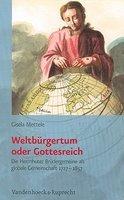
Book Summary
Using the example of the Moravian Church to examine the role that concepts of self and space play in creating a global community, Mettele traces the elaborate network of organization, communication, and collective memory that nurtured ties between settlements and missions spread around the globe. The Moravians understood themselves as a universal fellowship whose essential principle was that of the lifelong journey - a principle they applied both spiritually and literally. Soon after its foundation in 1727 in Saxony, the group organized extensive travel and missionary activities. They founded new settlements throughout Europe and North America, and set up mission stations in places as remote as Greenland, the West Indies, South Africa, and the Nicobar Islands. Moravians' sense of communal identity was sustained not only by close institutional links between distant settlements and the group's leadership in Saxony, but also by shared lifestyle, rituals and festivities, commonly read periodicals and devotional literature, and the regular circulation of reports from settlements and missions abroad. Over the course of the nineteenth century, the bonds linking the Moravian settlements nonetheless began to weaken despite technical advances in communication and transportation. Shifting identities and the development of rival (national) loyalties ultimately undermined the Moravians' determination to maintain their identity as members of a global community. German text.
Book Details
| Book Name | Weltburgertum Oder Gottesreich: Die Herrnhuter Brudergemeine ALS Globale Gemeinschaft 1727-1857 |
| Author | Gisela Mettele |
| Publisher | Vandehoeck & Ruprecht (Nov 2009) |
| ISBN | 9783525368442 |
| Pages | 335 |
| Language | German |
| Price | 2865 |








